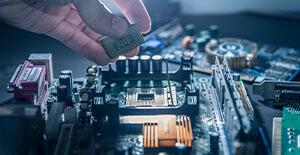How to Choose the Best Antivirus Software
Simplify your search for an antivirus software with this guide.
read morePublished on: June 1st, 2023

With a name like motherboard, it’s no surprise this component plays an important role in your laptop. As the central hub, it allows all the other components to communicate with one another, making it the backbone of your entire device. With such an essential role, it’s not surprising that a malfunctioning motherboard can cause significant problems.
Diagnosing motherboard problems can be challenging because issues with it can manifest in a variety of other problems. Below, we’ll cover some common causes of motherboard problems, walk through troubleshooting steps to diagnose your issue, and offer some solutions.
Because your motherboard is tied to so many pieces of your computer, issues with it can be hard to diagnose. Your processor, memory, hard drive, graphics card, and other peripherals all use it as a platform to communicate with one another. As a result, symptoms of motherboard failure can look like a variety of other issues.
One common symptom is the laptop failing to turn on, even when plugged in and fully charged. Sometimes, a computer with motherboard issues will turn on but won’t fully boot up or will frequently freeze during use. Other signs include the laptop running slower than usual, unusual noises, or specific components, such as the keyboard or touchpad, not functioning correctly.
A variety of culprits can cause motherboard failure, but power surges, overheating, and physical damage are common causes. Power surges can happen during thunderstorms or when you plug or unplug your laptop from a power source. These sudden spikes in voltage can damage the motherboard and other components like the hard drive and memory. Overheating can also cause significant damage to your laptop’s internal components, including the motherboard. This can happen when dust and debris build up inside your laptop, or when your cooling system is malfunctioning. Like all technology, age is also a factor; motherboard components can degrade and fail over time.
 If you suspect that your motherboard is the cause of your laptop’s issues, then checking for power and trying to boot up your computer are good starting points. You can also run diagnostic tests or look through your computer’s event log for error messages that may point to the source of the problem.
If you suspect that your motherboard is the cause of your laptop’s issues, then checking for power and trying to boot up your computer are good starting points. You can also run diagnostic tests or look through your computer’s event log for error messages that may point to the source of the problem.
Unless you know of a significant ding or drop, you likely won’t be able to determine physical damage without opening up your device. Inside, you can check for any build-up of dust or debris within the laptop that may have caused overheating and damage to the internal components. If you’re comfortable doing so, you can also try reseating the RAM or any loose connections.
If you’ve tried all of the above and are still experiencing motherboard issues, it’s often best to bring it to the computer repair experts. A professional can determine what’s happening and help you find the next best course of action.
Diagnosing motherboard problems can be a challenging task, but the cause will determine how you can resolve the issue. Sometimes, you can replace a damaged capacitor or fried chip rather than the entire motherboard. If the failure is due to overheating, you may be able to clean out the internal components or add additional cooling to help get things up and running.
For expert help with your computer issues, contact your local technology superheroes! Find a Computer Troubleshooters near you to get started.
Simplify your search for an antivirus software with this guide.
read moreHave you received this notorious Windows error screen? Here’s how to fix it.
read more© 2025 Computer Troubleshooters. Privacy Policy | Terms of Service | Accessibility Statement